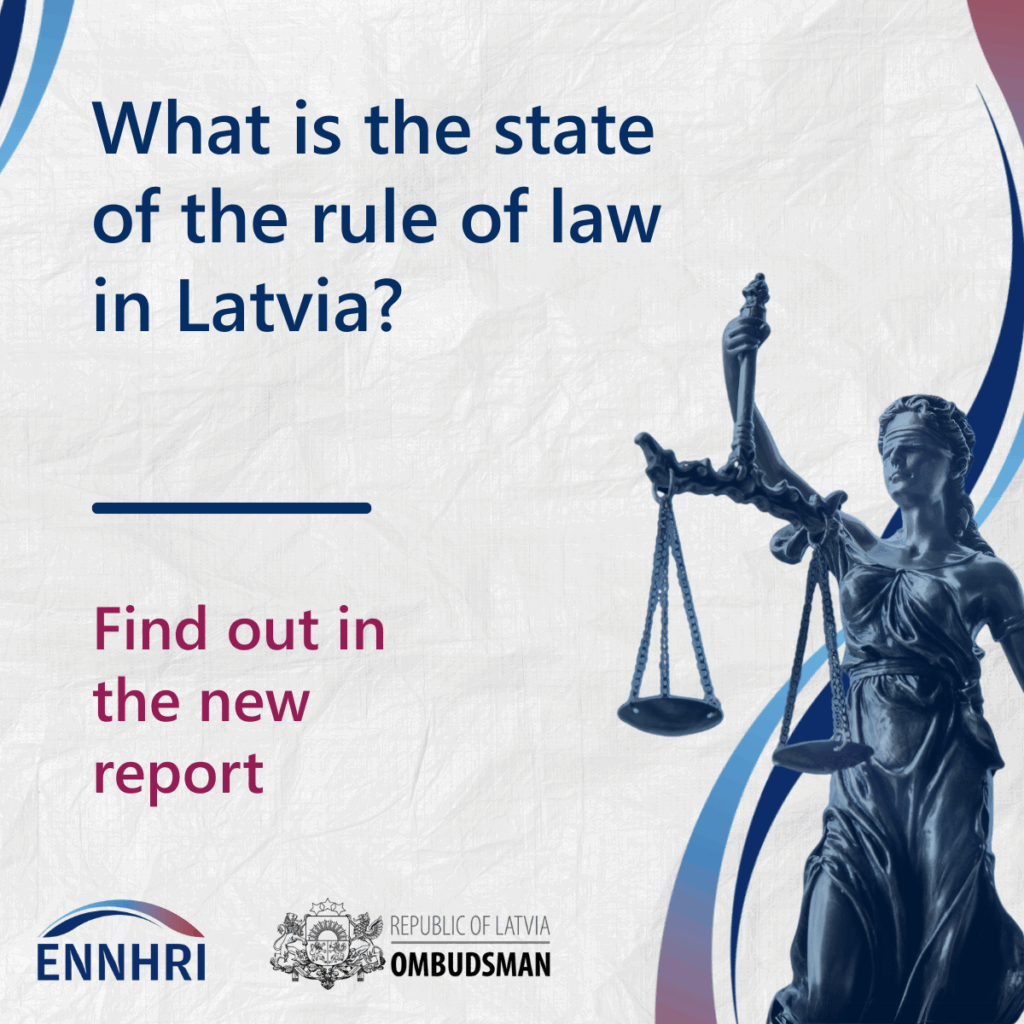Rule of Law Report. What is the situation in Latvia?

Rule of law guarantees democracy and citizens’ rights and freedoms; it is one of the fundamental values of the European Union (EU). Although each Member State has their national laws, they must act in accordance with EU requirements to jointly promote the interests of democratic countries and the rights of individuals.
For the sixth year in a row, the European Network of National Human Rights Institutions (ENNHRI) has been inviting participating institutions to report on the situation in their country, focusing on various aspects of human rights and rule of law. The report is an opportunity to see Latvia in relation to other EU countries, to assess aspects where our country manages to implement good practices and where improvements are needed. At the same time, it is also an opportunity for the Ombudsman’s Office to show what the institution has done to strengthen human rights in Latvia.
Some of the areas described in the report are highlighted here, the full report includes detailed information on these and other aspects of the rule of law.
It is worth highlighting the fact that, as of 6 March 2025, the functions of the National Preventive Mechanism (NPM) have also been enshrined in the Ombudsman’s Law. In practice, the Ombudsman’s Office has been performing these functions for several years. At the same time, preventive work with monitoring human rights becomes the duty of the Ombudsman. The report mentions that work on the implementation and strengthening of the NPM has also taken place in other countries, such as Belgium and the Netherlands. National human rights institutions in individual countries have obtained other new mandates.
If we compare the National Human Rights Institution of Latvia or the Ombudsman’s Office with similar institutions in other EU countries, it is still important to highlight that the Ombudsman is entitled to turn to the Constitutional Court if he sees that other means and efforts to solve the problem have not been effective. For example, in 2025, following an application by the Ombudsman, the Constitutional Court initiated two cases: one case on the right of students to receive a scholarship for social support, and another case on the regulation of noise assessment and management. The authorities of other countries do not have such a right; accordingly, it is difficult to influence the rule of law at constitutional level.
As another important cornerstone of a healthy rule of law, we want to highlight the Ombudsman’s role in educating the public. The Office’s experts have been actively involved in the ‘Ready for Life’ programme for school children, promoting open dialogue and lively conversations with young people. The Office has been education the society on several other topics, such as the respect of patients’ rights and the prevention of human trafficking risks, working with both public and sectoral specialists. Several studies were carried out in 2024, in particular, regarding discrimination prevention. Information on the studies is available to the public on Ombudsman’s website.
Ombudsman’s Office stands out in the ENNHRI report with very high rates of implementation of the recommendations issued by the institution. At least 61% of the Ombudsman’s recommendations have been implemented, which is a very good performance and testifies to the institution’s constructive, meaningful and internationally appreciated work.
ENNHRI Rule of Law Report is available on the ENNHRI website. In addition, the European Commission (EC) has also published its Rule of Law Report. The two reports are complementary, but the EC report is binding on the country and commits to action. The Commission has drawn the attention of the Latvian authorities to the following recommendations: 1) to take measures with the aim of ensuring adequate safeguards that would prevent unauthorised political influence in the procedures for the appointment of Supreme Court judges, taking into account European standards on the appointment of representatives of the judiciary; 2) to ensure the effective implementation of legislation on lobbying, including with regard to a special temporary register of lobbyists.
